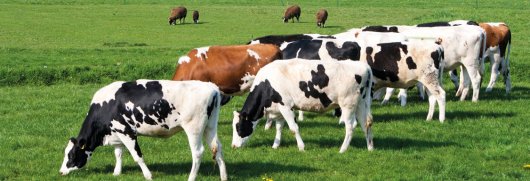RumenPredict

Predicting appropriate GHG mitigation strategies based on modelling variables that contribute to ruminant environmental impact
Ruminant production is responsible for ~ 9% of anthropogenic CO2 emission and 37% of CH4 emissions. Release of methane results in 6-12% less energy being available to the animal. Ruminants also contribute towards NO2 within the environment, a persistent gas in the atmosphere which has 296 times more warming potential than CO2. RumenPredict brings together members of the international Rumen Microbial Genomics network (led by IBERS, AU), of which the Hungate 1000 (focussed on sequencing 1000 rumen microbes) and the Rumen Census (focussed on evaluating effects of diet, host genetics and geographical location on the rumen microbiome) are projects within.
RumenPredict brings together key members of the RMG network to generate the necessary data to link rumen microbiome information to host genetics and phenotype and develop feed based mitigation strategies. This will enhance innovative capacity and allow integration of new knowledge with that previously generated to devise geographic and animal-specific solutions to reduce the environmental impact of livestock ruminants. The project members have access to recent data/tools resulting from an array of projects, and RumenPredict will build upon and enhance the integration of knowledge generated from these projects whilst providing innovation through further testing and validation of key hypotheses resulting from the previously obtained data. RumenPredict will provide a platform for predicting how host genetics, feed additives or microbiome may affect emission phenotypes and develop genetic/diet/prediction technologies further for implementation to improve nitrogen use efficiency whilst decreasing environmental impact of ruminants.
Coordinator
Queen's University, Northern Ireland
Dr. Sharon Huws
Project partners
Natural Resources Institute Finland, Finland
Agresearch, New Zealand
Swedish University of Agricultural Sciences, Sweden
Teagasc, Ireland
Irish Breeding Federation, Ireland
University College Dublin, Ireland
Wageningen University, The Netherlands
Institut National de Recherche en Agronomie (INRA), France
Total requested funding
1,592,000 €
Project duration
36 months
Social media
Unfortunately, your cookie settings do not allow the social media element to be displayed. check your settings.
NEWS from RumenPredict
2020.05.18

To date detailed measurements of methane output and feed efficiency on over 250 beef cattle have been conducted by RumenPredict project partners at Teagasc and ICBF in Ireland. Two GreenFeed systems have been installed at the ICBF progeny test centre in Tully (Ireland), for estimations of methane output. Preliminary data thus far, suggests a near 20% difference in the gross methane emissions output between high and low cohorts of animals. In addition to phenotypic data, rumen samples have been collected from each animal for microbiome analysis including metataxonomic, metagenomic and metatranscriptomic sequencing. Rumen samples are currently undergoing analysis at Wageningen University and Teagasc. This comprehensive RumenPredict dataset, complemented by data from the RuminOmics project and MASTER, will help to identify a linkage between the genetics of the host and its constituent rumen microbiome. Furthermore, samples from RumenPredict will form part of the Global Research Alliance initiated Enteric Fermentation Flagship project.
